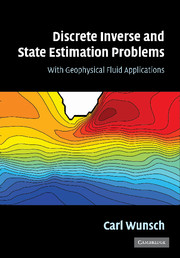6 - Applications to steady problems
Published online by Cambridge University Press: 28 October 2009
Summary
The focus will now shift away from discussion of estimation methods in a somewhat abstract context, to more specific applications, primarily for large-scale fluid flows, and to the ocean in particular. When the first edition of this book (OCIP) was written, oceanographic uses of the methods described here were still extremely unfamiliar to many, and they retained an aura of controversy. Controversy arose for two reasons: determining the ocean circulation was a classical problem that had been discussed with ideas and methods that had hardly changed in 100 years; the introduction of algebraic and computer methods seemed to many to be an unwelcome alien graft onto an old and familiar problem. Second, some of the results of the use of these methods were so at odds with “what everyone knew,” that those results were rejected out of hand as being obviously wrong – with the methods being assumed flawed.
In the intervening 25+ years, both the methodology and the inferences drawn have become more familiar and less threatening. This change in outlook permits the present chapter to focus much less on the why and how of such methods in the oceanographic context, and much more on specific examples of how they have been used. Time-dependent problems and methods will be discussed in Chapter 7.
Information
- Type
- Chapter
- Information
- Discrete Inverse and State Estimation ProblemsWith Geophysical Fluid Applications, pp. 279 - 339Publisher: Cambridge University PressPrint publication year: 2006
